Melasma
Melasma generally manifests as brown or gray discoloration across the cheeks, forehead, nose, chin, or upper lip, and is usually uniform and symmetrical on both sides of the face. While most common on the face, melasma can also appear on other sun-exposed areas, such as the neck and forearms.
Melasma can affect anyone, but it is more prevalent among young women with darker or olive skin types. It is associated with female hormones estrogen and progesterone, making it more common in women who are pregnant, using hormone-based birth control (particularly oral contraceptives), or taking hormone replacement therapy. Due to its association with pregnancy, melasma is sometimes referred to as the “pregnancy mask.”
A skin consultation with one of our expert dermatologists at Pinnacle Dermatology can start you on your journey to healthy skin. Learn more about melasma and schedule an appointment with Pinnacle Dermatology today to receive personalized care and effective treatment options. Explore our website for more information and to book your appointment online.
Examples of Melasma
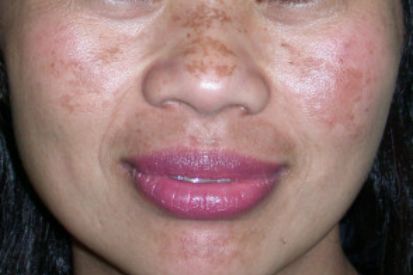
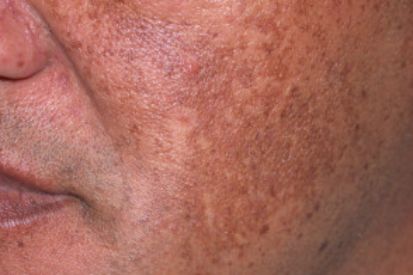
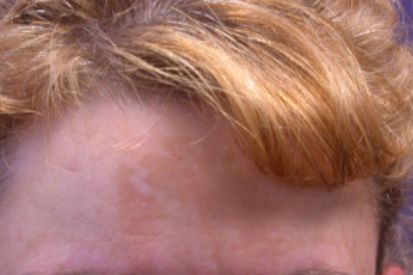
What are the Symptoms of Melasma?
- Very common skin disorder that occurs on areas of the face that are exposed to the sun, creating dark discolorations on the skin.
- Melasma generally manifests itself in a brown or gray discoloration across the cheeks, forehead, nose, chin, or upper lip.
- Melsama is most often uniform and symmetrical on both sides of the face.
Causes of Melasma
- Melasma can affect anyone, but more prevalent among young women with darker or olive skin types.
- Associated with female hormones estrogen and progesterone, making it more common in women who are pregnant.
- Melasma occurs with sun exposure.
- Certain skin products can irritate or worsen melasma.
How to Prevent Melasma
- Sunscreen: Apply a broad-spectrum sunscreen with a high SPF daily, even on cloudy days. This shields the skin from UV rays, a significant contributor to melasma.
- Sun Avoidance: Minimize sun exposure, especially during peak hours. Wear wide-brimmed hats and protective clothing when outdoors.
- Skincare Routine: Use skincare products that contain ingredients like niacinamide, vitamin C, or alpha arbutin known for their skin-lightening properties. Consult a dermatologist for personalized recommendations.
- Hormonal Management: For women, discussing hormone-related triggers with one of our trusted dermatology providers and exploring birth control options that may not exacerbate melasma can be beneficial.
- Avoiding Irritants: Limit the use of products or treatments that may irritate the skin, potentially triggering melasma. This includes harsh chemical peels or abrasive exfoliants.
- Pregnancy Planning: For women experiencing melasma related to pregnancy, consulting with a healthcare provider before conception can help manage hormonal changes that may contribute to melasma.
- Healthy Lifestyle: Adopting a balanced diet, staying hydrated, and managing stress contribute to overall skin health.
Melasma FAQs
Melasma is a common skin condition causing brown or gray-brown patches, usually on the face. Hormonal changes, sun exposure, and genetics can contribute. It’s like a temporary visitor, often linked to hormonal shifts like pregnancy or birth control.
The good news is that melasma can be treated. Dermatologists have various options, including topical creams, chemical peels, and laser treatments. With the right approach, those patches can fade away.
Sunscreen isn't just for beach days. Daily use, even on cloudy days, helps prevent melasma from getting darker. It's like giving your skin a shield against those pesky patches.
While melasma may fade on its own, seeking professional help accelerates the process and ensures better results. Dermatologists can tailor a plan, offering effective treatments and personalized advice for your unique skin.
Yes, makeup is safe, and it can be a confidence booster. However, it's crucial to choose products that won't worsen melasma. Dermatologists can recommend makeup that conceals while being gentle on your skin.
The Importance of Sunscreen for All skin Tones Explained By Dr. Awosika
How to Treat Melasma
We pride ourselves on working closely with patients, providing guidance on skincare routines, and recommending products to manage melasma effectively. Regular follow-ups ensure progress monitoring and adjustments to treatment plans, supporting you on your journey to healthy skin.
Featured Blogs
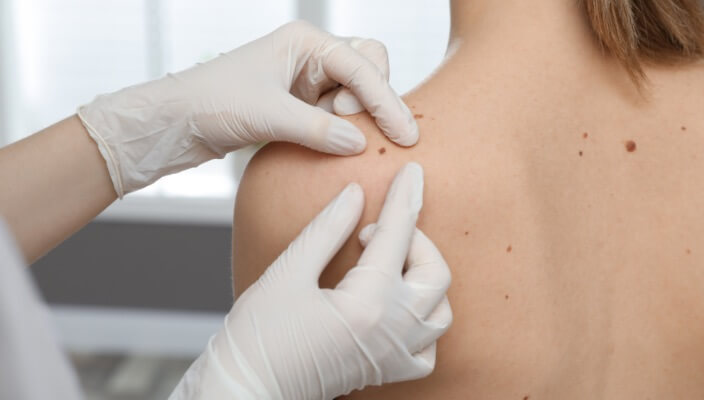
- Skin Cancer
- General Dermatology
- Skin Exams
Your skin is your largest organ and its first line of defense. Learn more about why a skin exam should be a part of your wellness routine.
Read More
- Skin Cancer
- Skin Exams
- Sun Safety
Discover the truth about UV radiation and sunscreen as we debunk common myths, empowering you to make informed choices for your skin's health and well-being.
Read More
- Skin Cancer
- General Dermatology
- Skin Exams
Learn the ABCDEs of Melanoma, the deadliest form of skin cancer.
Read MoreFeatured Products for Melasma

EltaMD UV Clear SPF 46
Oil-free EltaMD UV Clear helps calm and protect sensitive skin types prone to discoloration and breakouts associated to acne and rosacea. It contains niacinamide (vitamin B3), hyaluronic acid and lactic acid, ingredients that promote the appearance of healthy-looking skin. Very lightweight and silky, it may be worn with makeup or alone. Choose from tinted and untinted formulas for use every day. 1.7 oz / 48 g
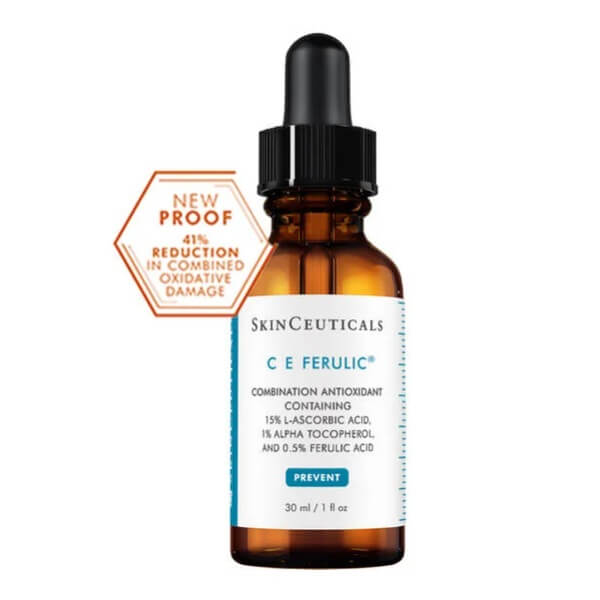
SkinCeuticals C E Ferulic
C E Ferulic features a synergistic antioxidant combination of 15% pure vitamin C (l-ascorbic acid), 1% vitamin E (alpha tocopherol), and 0.5% ferulic acid to strengthen skin's natural protection from free radicals induced by environmental stressors. 1 fl oz / 30 mL


